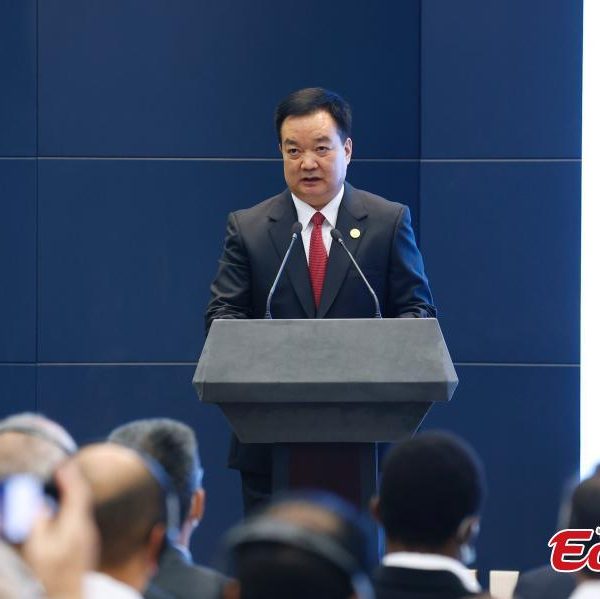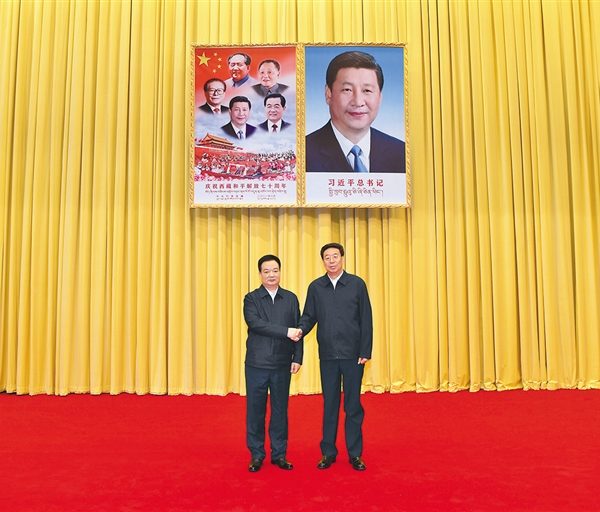In the ongoing nation-wide leadership reshuffle, the Chinese state news agency, Xinhua, announced the appointment of Wang Junzheng as the Party Secretary of the “Tibet Autonomous Region” (TAR), alongside with the appointment of six other party secretaries. One could argue that the decision to replace Wu Yingjie (b.1956), former Party Secretary of the TAR, was probably due to the mandatory age requirement of 65 for the provincial-level leadership.
Unlike Wu Yingjie, who has lived over 60 years in Tibet and has 47 years of experience working in the TAR, Wang Junzheng has zero Tibet experience. According to an unofficial biographical entry, Wang was born on May 17, 1963 in Shandong province. He was transferred to Xinjiang Uighur Autonomous Region (XUAR) in February 2019 from Jilin province where he served as the Party chief of the provincial capital Changchun. In Xinjiang, Wang was appointed head of the Political and Legal Affairs Commission (PLAC), perhaps on the credential that he had served as the head of the Kunming Political and Legal Affairs department during his long career in Yunnan province. The PLAC directly supervises the courts, procuratorate, and public security bureaus and prisons, thus wielding enormous coercive power.
In April 2020, Wang Junzheng was appointed party secretary and political commissar of the Xinjiang Production and Construction Corps (XPCC), also known as Bingtuan – a state-owned economic and paramilitary organization. Although the XPCC has been largely portrayed as instrumental in Xinjiang’s economic growth by building roads and infrastructure development, it is however noted to be a coercive military corps running many of the Xinjiang internment camps, which led to an unprecedented western governments’ coordinated sanctions against Wang and Chen Mingguo, who is head of the Xinjiang Public Security Bureau for perpetrating human rights violations against the Uighur people in Xinjiang.
Turning briefly to the history of TAR party secretaries, Wang Junzheng is the second Chinese party cadre to be promoted to TAR Party Secretary from Xinjiang after Zhang Qingli. Prior to the Party Secretary of the TAR from May 2006 to August 2011, Zhang held a series of key positions such as the commander of the paramilitary XPCC, deputy party secretary of the XPCC, deputy party secretary of the XUAR, and vice chairman of the Xinjiang Government. It is important to point out that the 2008 protests in Lhasa that eventually spread across the Tibetan Plateau took place during Zhang’s tenure as TAR Party Secretary. Zhang was widely known for his vituperative denunciations of the Dalai Lama by name-calling him such as “wolf in monk’s robe.”
With hindsight, we could argue that there has been some kind of coherent policy implementation in the XUAR and the TAR, based on the lateral transfers of top brass leadership of these two autonomous regions in recent decade. For instance, Wang Junzheng had served under the leadership of Chen Quanguo in Xinjiang. Chen in turn was transferred to Xinjiang after serving six years in the TAR, replacing the hardliner Zhang Qingli who was a former Deputy Party Secretary in the XUAR.
A leadership meeting was convened in the morning of October 19, 2021, attended by top honchos of the TAR Party and Government departments, including deputy secretaries of the TAR Party Committee and chairman of the TAR People’s Political Consultative Conference, Phakpa-Lha Geleg Namgyal. In the meeting, Zeng Yichun, Deputy Minister of the Central Organization Department, formally announced the Chinese Communist Party Central Committee’s decision to appoint Wang Junzheng as the new TAR Party Secretary, replacing Wu Yingjie. Wu was given a lucrative retirement post by appointing him as one of the Vice-Chairmen of the Education, Science, Culture and Public Health Committee of the 13th National People’s Congress (NPC).
In the same meeting, the new Party Secretary Wang emphasized the importance of President Xi Jinping’s speeches given during his recent TAR visit, the Fifth Central Ethnic Affairs Conference and the Seventh Tibet Work Forum, all of which focused on four major issues of stability maintenance, economic development, ecological protection and border security. The four major issues formed the guiding principles for governing Tibet in the new era keeping in view of sinicization and “ethnic” unity.

Wang Junzheng speaking at the Foreign Ministry event in Beijing (Photo: China News Service/Han Haidan)
A day after naming the new party chief, Wang Junzheng attended a special event organized by the Ministry of Foreign Affairs in Beijing on October 20, 2021. The event, themed “China on a New Journey: A New Chapter of Development for a Happy New Tibet,” was attended by foreign diplomats and representatives of international organizations based in China, where Wang spoke highly of China’s achievements in Tibet over the past 70 years, in terms of infrastructure development, poverty alleviation, favorable policies in education, skills training and employment, and freedom of religious belief in accordance with the law. Wang was accompanied by recently promoted acting Chairman of the TAR Government Yan Jinhai (Tibetan). The next day, Wang was seen meeting some retired senior Tibetan party cadres in Lhasa, including Ragdi who was believed to be influential in regional party politics.
Another important change in the TAR leadership is the appointment of Chen Yongqi (b.1967) to the Deputy Secretary of the TAR Party Committee, following the transfer of Che Dalha (b.1958) to Beijing in the beginning of October 2021. Chen was a member of the Standing Committee of the TAR Party Committee and his promotion will change the “ethnic” composition in the deputy party secretaries of the TAR Party Committee. In the previous composition, three out of four deputy party secretaries were Tibetans. Now the number of Tibetan has dropped to two with the transfer of Che and the subsequent appointment of Chen. Che Dalha has been appointed one of the Deputy Chairpersons of the Ethnic Affairs Committee of the 13th NPC, the position once held by Baba Phuntsok Wangyal. Two Tibetans have become chairperson of this committee since its inception in September 1954. Ngabo Ngawang Jigme retained the position of chairperson for three consecutive terms from 5th to 7th NPC and Dorje Tsering, former TAR Governor and former Minister of Civil Affairs, of the 10th NPC.
At the same time, He Wenhao (b.1964), a former member of the Standing Committee of the TAR Party Committee has been appointed a member of the Standing Committee of the Guangxi Zhuang Autonomous Region (GZAR). The important question is who will occupy this key position left vacant by He. Meanwhile, Liu Ning, who was Deputy Party Secretary of Qinghai provincial Party Committee and governor of Qinghai provincial Government before he was transferred to Liaoning province in July 2020 as the governor, has been appointed Party Secretary of the GZAR. It is interesting to note that both He and Liu had background in PLAC, while working in the TAR and Qinghai respectively.
Zhang Lifan, China based scholar and historian, argues, “Wang’s background in Xinjiang might mean that his transfer to Lhasa, Tibet’s capital, indicates the Chinese authorities’ determination to continue stringent policies against the Tibetan people.” But it remains to be seen what Beijing has in store for TAR with the appointment of a new party chief who has strong security background. And all these major appointments seemingly indicate Xi Jinping’s regional power solidification ahead of the 20th Party Congress in 2022.
*Mr. Tenzin Tseten is a research fellow at the Tibet Policy Institute. Views expressed here do not necessarily reflect those of the Tibet Policy Institute.

